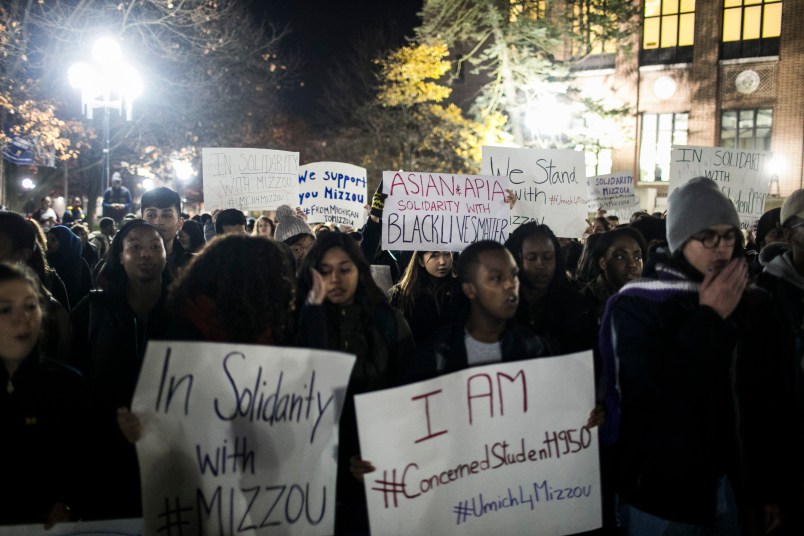BOSTON (AP) — It’s not always the slurs and the other out-and-out acts of racism. It’s the casual, everyday slights and insensitivities.
Sheryce Holloway is tired of white people at Virginia Commonwealth University asking if they can touch her hair or if she knows the latest dance move. At Chicago’s Loyola University, Dominick Hall says groups of white guys stop talking when he walks by, and people grip their bags a little tighter. And Katiana Roc says a white student a few seats away from her at West Virginia University got up and moved to the other side of the classroom.
As thousands of students took part in walkouts and rallies on college campuses across the country Thursday in a show of solidarity with protesters at the University of Missouri, many young black people spoke of a subtle and pervasive brand of racism that doesn’t make headlines but can nevertheless have a corrosive effect.
There’s even a word on campuses for that kind of low-grade insensitivity toward minorities: microaggression.
“It’s more the daily microaggressions than the large situations,” said Akosua Opokua-Achampong, a sophomore at Boston College.
When Opokua-Achampong tells other students that she’s from New Jersey, some ask where she’s REALLY from. “When you’re not white, you can’t just be American,” she said. (She was born in the U.S. to parents from Ghana.)

Students at Boston College raise their arms during a solidarity demonstration on the school’s campus. (AP Photo/Steven Senne)
Janay Williams, a senior at the University of California Los Angeles, said she is the only black person in her biology class and is routinely among the last picked for group assignments.
“Students don’t want to be in the same group as you with a group project, because they’re afraid you’re not going to do your share,” she said.
Jioni A. Lewis, a psychology professor at the University of Tennessee, said research has shown that the stresses of being a minority, on top of the usual pressures of adjusting to college, can cause some students to leave school.
Roc, a junior at West Virginia, said she can’t forget the day that student moved across the room.
“He looked uncomfortable. I’m pretty sure he moved because of the color of my skin. It didn’t hurt my feelings,” she said. “What disappointed me was his ignorance.”
She added that just being on campus can be a day-to-day struggle.
“But instead of me saying that I’ll transfer where I feel more comfortable, I’d rather stick it out here,” she said. “I’m not here for how people look at me; I’m here for my education.”
Stories like that aren’t new, students said. But many said the revolt at Missouri — and the Black Lives Matter movement that was set in motion by the shooting of a black man in Ferguson, Missouri — have finally driven them to talk about it and confront it.
On social media, students are sharing their personal experiences with racism, using the hashtag BlackOnCampus.
Students at some colleges have also presented administrators with lists of demands in recent days, inspired by those of the protesters at Missouri, who brought down the university president and chancellor this week over what they saw as a sluggish response to racial slurs and other incidents on campus.
Among other things, the student protesters around the U.S. are calling for greater diversity on the faculty, more spending on scholarships for minorities, more instruction on tolerance and sensitivity, and more resources such as cultural centers.
University administrators have responded by hosting diversity forums in recent days, or meeting to hear demands.
Students at some schools, such as the University of Michigan, said the Missouri case has emboldened them to take a harder stance against administrators if they don’t keep their promises.
Holloway, the Virginia Commonwealth student, said she used to try to ignore subtler instances of racism. But she has decided not to keep quiet anymore.
“It’s hard when it’s something you see every day,” she said. “It’s exhausting. It’s fatiguing and, you know, we’re frustrated.”
___
Whack reported from Philadelphia.
Copyright 2015 The Associated Press. All rights reserved. This material may not be published, broadcast, rewritten or redistributed.







“(She was born in the U.S. to parents from Ghana.)”
Kind of proves her point about it being systemic, doesn’t it?
When Opokua-Achampong tells other students that she’s from New Jersey, some ask where she’s REALLY from. “When you’re not white, you can’t just be American,” she said.
Ironically, in at least some cases this is a cultural misunderstanding where more recent arrivals consider themselves more “American”. When I was growing up in Massachusetts in the 1970s among a group of mostly second to fourth generation immigrant kids, “where are you from?” always meant “where is your family from?”. Nobody ever considered themselves just American, they were always Irish, Italian, or Greek (many still spoke Italian at home; the horror of those unassimilated people!).
I’m sorry, but Roc’s complaint seems a bit shaky. Maybe she had on too much perfume. Or maybe he couldn’t see the professor where he was sitting. Or…or…or… There could be dozens of possible reasons for him to have moved. Yeah, maybe he was racist. But the fact that he moved seats is not enough evidence to charge him with that, let alone convict him.
What a bunch of wimpy, paranoid people, too worried about what other people allegedly think of them.
If this kid was anything like some of the kids I went to school with he could have just not wanted to sit near anyone.
I get that racism has a constant caustic effect on people and can multiply daily stress. But it seems that the lines are becoming increasingly blurred when it comes to what is racism.